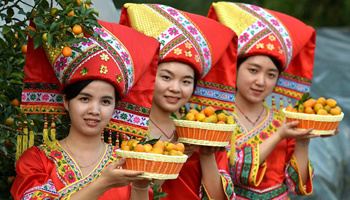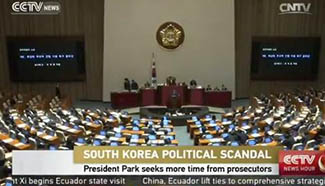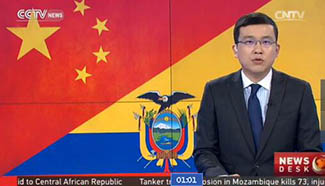UNITED NATIONS, Nov. 18 (Xinhua) -- The Food and Agriculture Organization (FAO) and the World Food Program (WFP) on Friday called once again for more urgent support to farmers in southern Madagascar, hit by three years of devastating drought.
Farhan Haq, the deputy UN spokesman, said at a daily news briefing here that 67 million U.S. dollars are needed in food aid and farming support for the upcoming planting season.
"FAO will start distributing plant cuttings and seeds next month, targeting some 170,000 farming families in the most food-insecure districts of the south," Haq said.
"Overall, some 1.4 million people are estimated to be food insecure in the three southern regions of the island," he added.
As part of the WFP relief plan, the local people will also receive food or cash to ensure they are sustainable until the next harvest in March and April.
Since June, WFP has been distributing food to people in areas with the greatest need, as well as providing cash in areas with functioning markets.
"The planting season offers a small window of opportunity for local farmers to restore agricultural production," said FAO Director-General Jose Graziano da Silva.
"Thousands of families are already facing hunger. Missing the planting season now will result in a serious food and livelihood crisis and render their situation even more desperate," she said.
According to the latest Integrated Food Security Phase Classification (IPC) findings, some 850,000 people, or half of the population in southern Madagascar, are facing hunger and in urgent need of humanitarian assistance.
The findings are an indication that food and nutrition security could worsen in the coming months unless humanitarian efforts are rapidly scaled up.
In southern Madagascar, some 1.4 million people are considered food insecure.
FAO is sourcing sweet potato and cassava cuttings, as well as a variety of drought-tolerant seeds and tools for smallholder farmers.
"But, through a joint response, (FAO and WFP) can begin to turn this situation around, not only by providing immediate relief but by giving communities the means they need to feed themselves," she said.
Ongoing droughts in Madagascar have led to significant declines in the production of maize, cassava and rice production in the southern parts of the island.
Moreover, rising prices are reducing people's purchasing power and eroding food security of those who are most vulnerable. Many households have already adopted survival strategies, including eating less, selling animals, agricultural tools and even land.
WFP and FAO have secured funds to launch the initial stages of their joint planting assistance program, but cannot reach all drought-hit farms without additional financing. FAO has received 4.5 million U.S. dollars of the 22 million dollars needed.
WFP's drought relief operation, to continue until March of next year, is 50 million dollars short of the 82 million dollars required.
FAO's immediate plan is to target 850,000 people, including 170,000 small-scale farming households in most-affected areas. Their assistance includes support for the planting season and livestock production.
WFP will continue with food and cash relief operations to reach some one million vulnerable people by the end of November.










